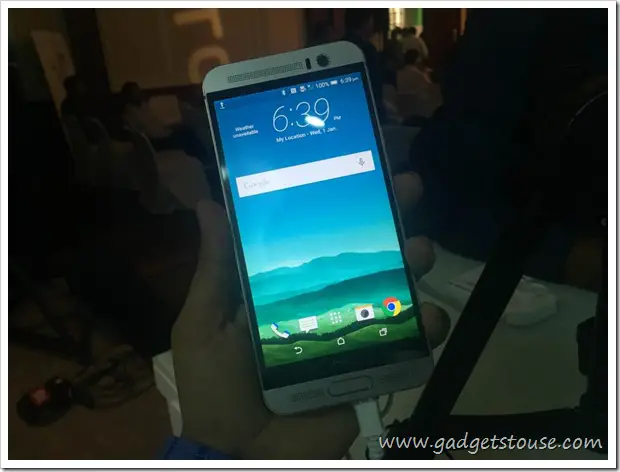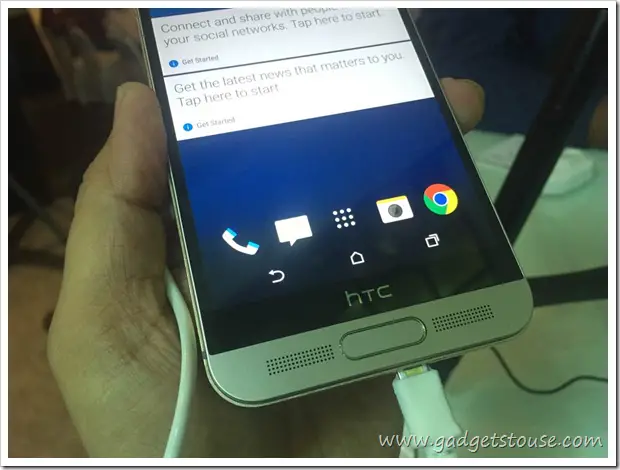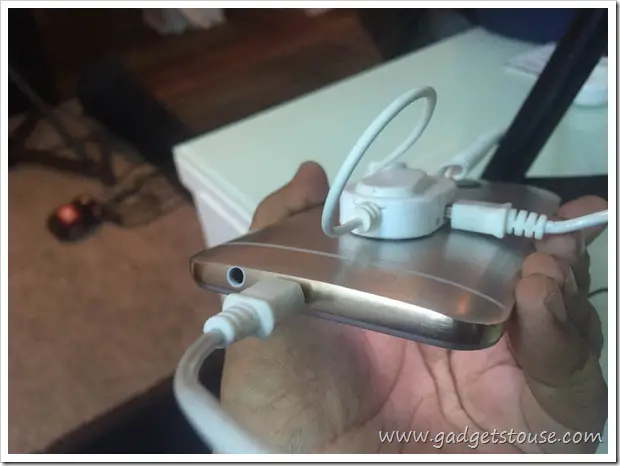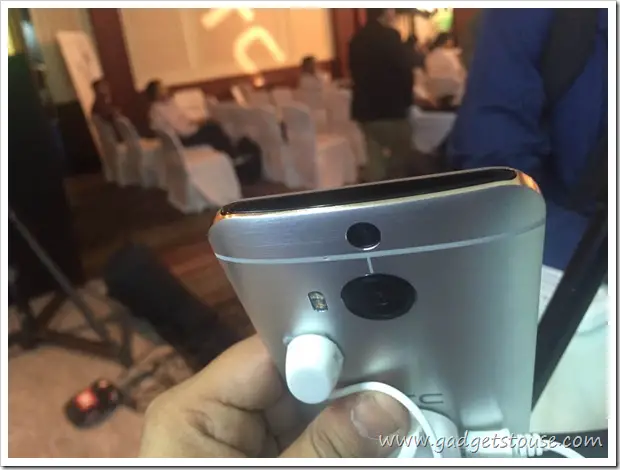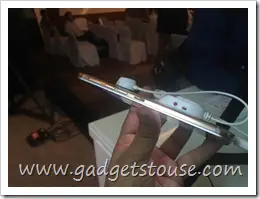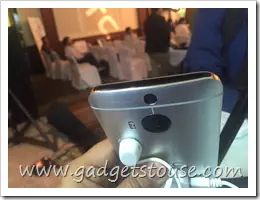HTC One M9 Plus Quick Specs
Display Size: 5.5 Inch Quad HJD 2K IPS LCD, Corning Gorilla Glass 4Processor: 2.2 GHz MediaTek Helio X10 (MT6795T) Octa-Core 64-bit (Cortex A53) processor with PowerVR G6200 GPURAM: 3 GBSoftware Version: Android 5.0 Lollipop with HTC Sense 7.0 on topCamera: 20 MP rear camera, 4K video recordingSecondary Camera: 4 MP Ultra pixelInternal Storage: 32 GB External Storage: MicroSD support up to 128 GBBattery: 2840 mAhConnectivity: 4G LTE, HSPA+, Wi-Fi 802.11 b/g/n/ac, Bluetooth 4.0 with A2DP, aGPS, GLONASS, NFC, IR Blaster, Fingerprint sensor
Design, Build and Display
HTC One M9 Plus has the same brushed metal two tone (Gold on Silver/Gold on Gold) premium design as on One M9. The new material HTC is using is lot less slippery and feels different when compared to last generation devices. HTC One M9 Plus measures 150.99 x 71.99 9.61 mm, which means it has the same thickness as One M9, but is slightly taller and marginally wider. Below the display, the black HTC bar is still there and the Boom sound speaker grill at the bottom is split by the presence of touch based fingerprint sensor. The fingerprint sensor can not be pressed down, but can be used to unlock device and as home button. It is an extremely well crafted and well balanced device. On the rear side, camera sensor is circular (not rectangular as in One M9) and is accompanied by a depth sensor.
The Super LCD3 display is slightly bigger, being 5.2 inches in size and sees a mammoth increase in resolution. HTC makes beautiful Super LCD displays and One M9 Plus display is no exception either. On One M9, the company had chosen to go with trusted 1080p SLCD 3 display, for better battery life (we would readily take that trade off), but HTC One M9+ isn’t willing to compromise on Quad HD fad. Like always the display seems gorgeous with rich colors and wide viewing angles. Scratch resistant and fall enduring Gorilla Glass 4 is also layered on top.
Recommended: HTC One M9 Hands on, Photo Gallery and Video
Processor and RAM
Processor used is MediaTek’s high end MT6795T, which belongs to Helio X family, which MediaTek has specially designed for high end devices.
The chipset includes 8 cortex A53 cores, in two clusters clocked at 2.2 GHz. Since MediaTek is shooting for high end market, you can expect other chipset aspects like Modem, ISP, DSP, etc to improve too. The chipset also includes PowerVR G6200 GPU (same as in Vibe X2) and 3 GB RAM for efficient multi tasking. In our initial testing, performance was very snappy, and we expect that to hold in the long run.
Camera and Internal Storage
HTC One M9 camera didn’t get great reviews, though HTC tried to rectify it via software update later. The same camera setup has been used for One M9 Plus as well. There is 20.7 MP rear camera (Toshiba sensor) with dual tone LED flash along with a depth sensing camera up top on the rear side.
Depth sensor was also present in One M8, but was soon classified as gimmicky and thus its elimination in One M9 didn’t stir any commotion. Nevertheless, you can use it to click images and focus on different objects later. At front there is a 4 MP Ultrapixel camera with large pixels for better low light selfies. Since media consumption is a high priority with HTC devices, MicroSD card slot hasn’t been compromised on One M9 Plus either. Besides optional 128 GB MicroSD storage, there is 32 GB Nand flash storage on the device too. Perhaps, that should satisfy all categories of users.
Recommended: HTC One M9 VS Samsung Galaxy S6 Comparison Overview
Battery and User Interface
The battery capacity remains same at 2840 mAh. Since the display resolution has been dramatically increased, we expect the extra burden to reflect poorly on battery backup stats. Though, it is still too early to ascertain that, as power efficiency of MediaTek Helio X10 chip remains untested till date. HTC is using Sense 7 UI skin on top of Android 5.0.2 Lollipop. Feature set includes refined blink feed, with suggestions, new theme elements which let you make custom themes molded around any image in your gallery.
HTC One M9 + Photo Gallery
Conclusion
HTC One M9 and HTC One M9 Plus are meant for and will be launched in different markets. While south Asian regions will get only One M9 Plus, North America and Europe will get One M9. This is probably because mainstream users value specs a lot in this part of the world. HTC One M9 offers powerful hardware, great build and design and cool software. If HTC manages to keep a flagship grade camera and battery performance, it might justify 52,500 INR price tag.
